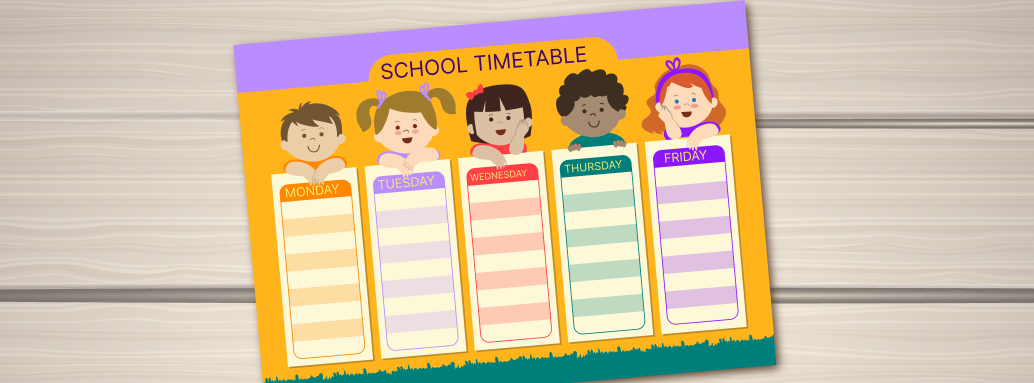Have you ever wondered why a structured day is crucial for young children? It's not just about keeping them busy; it's about providing a sense of security and fostering an environment conducive to learning and development. A well-planned day can significantly influence a child's emotional, social, and cognitive growth.
Introduction: The Importance of a Structured Day
When it comes to raising young children, one of the most crucial aspects of their development is establishing a structured daily schedule. A well-thought-out daily routine not only provides a sense of security and predictability for children but also plays a pivotal role in their early childhood education and development. In this article, we'll delve into the importance of creating a daily schedule for young children and provide you with practical tips on how to craft one that suits your child's needs.
Understanding the Basics of a Child's Daily Schedule
Why Consistency Matters
Consistency in a child's day offers predictability, which is essential in making them feel secure. A regular schedule helps children understand what to expect, reducing anxiety and behavioral issues.
Flexibility Within Structure
While consistency is key, flexibility shouldn't be overlooked. Children are naturally curious and spontaneous, so it's important to allow room for exploration and unplanned learning opportunities.
The Role of Routines in Early Development
Routine activities, like meal times and nap times, play a vital role in a child's early development. They not only instill a sense of time and discipline but also help in developing healthy habits.
The Significance of a Daily Schedule
1. Building Consistency and Routine
Children thrive on routine and predictability. A consistent daily schedule helps them understand what to expect and fosters a sense of security. This regularity is particularly crucial for young children who are just beginning to grasp the concept of time and order.
2. Promoting Independence
A well-structured schedule encourages children to become more independent. When they know what's coming next, they can start to take charge of their daily activities, such as dressing themselves or cleaning up their toys.
3. Supporting Emotional Regulation
Emotions can run high in young children. A structured routine helps them manage their emotions better by providing a safe space to express themselves and reducing anxiety that may arise from uncertainty.
4. Enhancing Learning Opportunities
Early childhood is a critical period for learning and development. A daily schedule can incorporate various educational activities that stimulate a child's cognitive, physical, and social growth.
Creating the Perfect Daily Schedule
1. Balancing Activities
A balanced schedule should include a mix of educational, physical, social, and creative activities. It's crucial to strike a balance between active play and quiet time to cater to all aspects of a child's development.
2. Age-Appropriate Planning
When planning activities, always consider the age and developmental stage of the children. Activities should be challenging enough to be engaging but not so difficult that they become frustrating.
3. Incorporating Learning and Play
Learning and play are not mutually exclusive. Incorporating educational elements into playtime makes learning fun and more effective for young children.
4. Assess Your Child's Needs and Rhythms
Every child is unique, and their daily schedule should reflect their individual needs and natural rhythms. Pay attention to their sleep patterns, eating habits, and energy levels to create a schedule that aligns with their biological clock.
5. Prioritize Sleep
Adequate sleep is fundamental for a child's well-being and development. Ensure your schedule includes ample time for naps and a consistent bedtime routine to promote healthy sleep habits.
6. Balance Active and Quiet Time
Young children need a mix of active play and quiet, focused activities. Design your schedule to include both, allowing them to expend their energy and also engage in activities like reading or drawing.
7. Include Learning and Play
Incorporate structured learning activities into your child's daily routine. This can include reading together, simple math exercises, or art projects that encourage creativity and problem-solving.
8. Mealtimes Matter
Regular, nutritious meals are essential for a child's growth and development. Make sure your schedule includes designated meal and snack times, promoting healthy eating habits.
9. Factor in Transitions
Children can find transitions between activities challenging. Give them gentle reminders and create a transition routine to help them move smoothly from one activity to the next.
Implementing the Schedule in Various Settings
1. At Home
Parents can implement a daily schedule at home by setting regular times for meals, play, and rest. Involving children in the planning process can also make them more enthusiastic about following the schedule.
2. In Educational Settings
In preschools and daycare centers, schedules should include group activities, individual playtime, and rest periods. Teachers play a vital role in ensuring that the schedule is followed while being attentive to the needs of each child.
3. The Role of Caregivers
Caregivers, be it parents or teachers, need to be consistent in enforcing the schedule while being empathetic towards the child's needs and moods.
Overcoming Challenges in Schedule Implementation
1. Dealing with Resistance
Resistance to schedules is common among young children. The key is to introduce changes gradually and maintain a positive attitude.
2. Adapting to Individual Needs
Every child is unique, and their schedules should reflect their individual needs. Observing each child's response to the schedule and making adjustments accordingly is crucial.
The Long-Term Benefits of a Well-Structured Day
1. Developing Life Skills
A well-planned daily schedule helps in developing essential life skills such as time management, discipline, and the ability to follow routines.
2. Fostering Independence and Confidence
As children get accustomed to a routine, they begin to anticipate what comes next, fostering a sense of independence and confidence.
3. Academic and Social Advantages
Children who follow a structured schedule often find it easier to transition to formal schooling. It also helps in developing social skills as they interact with others during scheduled activities.
Putting It All Together
1. Flexibility is Key
While a structured schedule is important, it's equally crucial to remain flexible. Life can throw unexpected curveballs, so be prepared to adjust the schedule when necessary.
2. Communicate and Involve Your Child
As your child grows, involve them in the schedule-making process. Ask for their input and preferences, fostering a sense of ownership over their routine.
3. Seek Support from Early Childhood Experts
Don't hesitate to consult with experts in early childhood education and development. They can provide valuable insights and guidance to tailor your child's schedule for optimal growth.
4. Monitor and Adjust
Regularly assess how the schedule is working for your child. Are they thriving, or are there signs of stress or boredom? Make adjustments as needed to ensure it continues to meet their needs.
Conclusion: The Path to a Balanced and Joyful Childhood
Creating a daily schedule for young children is not just about organizing their day; it's about laying a foundation for a balanced, happy, and fulfilling childhood. As we blend structure with flexibility, we pave the way for our children to grow into well-rounded, confident, and capable individuals.
Crafting a daily schedule is a delicate balance of structure and flexibility. It involves understanding the unique needs and developmental stages of each child, while also promoting essential life skills like time management and independence. The impact of a well-structured day goes beyond mere routine; it lays the groundwork for a happy, balanced, and fulfilling childhood.
In the journey of early childhood education and development, creating a daily schedule for young children stands as a cornerstone. It provides them with a sense of security, fosters independence, and supports emotional regulation. By carefully assessing your child's needs, prioritizing sleep, and balancing various activities, you can craft a schedule that promotes their overall well-being and growth.
FAQs
-
What are some key elements to include in a daily schedule for toddlers? Key elements for a toddler's daily schedule should include structured playtime, nap or quiet time, meal times, and opportunities for both individual and group activities. Incorporating sensory play and outdoor time is also beneficial for their overall development.
-
How can parents effectively transition their child into a new daily routine? Transitioning into a new routine can be eased by gradually introducing changes. Start by implementing one part of the new schedule at a time. Consistency and positive reinforcement help in making the transition smoother. Also, involving the child in the process, like choosing activities, can increase their willingness to adapt.
-
Are there any specific times of the day best suited for learning activities for young children? Typically, mornings are considered ideal for learning activities as young children are usually more alert and attentive after a good night's sleep. However, it's important to observe each child's individual patterns and preferences, as some may respond better to educational activities at different times of the day.
-
How long should each activity in the schedule last for preschoolers? The duration of each activity should be tailored to the child's age and attention span. For preschoolers, activities that last between 15 to 30 minutes are generally effective. It's important to be flexible and adjust the time based on the child's engagement and interest in the activity.
-
Can a daily schedule help with a child's behavioral issues? Yes, a well-structured daily schedule can significantly help in managing behavioral issues. It provides a sense of predictability and security, which can reduce anxiety and stress in children. This predictable structure helps them understand expectations and routines, which can lead to improved behavior.
Billing, Invoicing Automation & Smart Finances
Communication & Engagement
Child Development & Progress
Waitlist, Forms & Attendance
Effortless Team Management
Daily Updates That Matter
Templates & Printables
Blogs
Webinars
Case Studies & Testimonials
FAQs
Help Center


